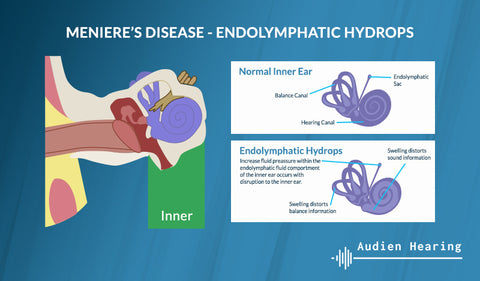Meniere’s Disease is an inner ear malady causing vertigo and Tinnitus. It has received greater attention in recent years as celebrities such as Huey Lewis and Ryan Adams have gone public concerning their struggles with it. There is no known cure for the condition, although it is treatable.
How Does Meniere’s Disease Affect The Body?

Meniere’s Disease is a peripheral vascular disorder. In plain English, this means it is a condition causing blood vessels in key areas to malfunction. In this case, around the brain.
This is why the disease causes vertigo. The brain is key to our ability to maintain balance. Visual signals are processed in conjunction with other information coming from our vestibular systems (in the inner ear) and our muscles and joints.
The disease can have a detrimental effect on the quality of life in two ways. First, hearing can be compromised. As the problem develops, it becomes difficult to hear low or combination frequencies. Second, the disease can cause vertigo. The average case only occurs in one ear, but according to some estimates, 25% of sufferers have it in both. The vast majority of sufferers are in their 40s and 50s.
Individuals with this condition will experience concentrated episodes, wherein they experience vertigo, hearing loss, and an exaggerated feeling of fullness within the ears. These episodes normally last between two and four hours and can be quite disorienting and frightening.
What Causes Meniere’s Disease?

Unfortunately, Meniere’s Disease is not well understood. However, there is fairly wide agreement that its immediate cause is a change in the volume of inner ear fluid. When fluid flows normally through the area of our inner ear known as the labyrinth, our brain adjusts to movement carefully and proportionally. However, the accumulation of fluid seems to throw off the signals sent to the brain by disrupting its ability to adjust properly to movement.
Many factors can alter the volume and concentration of fluid in the inner ear. Some examples of problems that may induce this change include viral infections, allergic reactions, autoimmune reactions, and migraines.
How Can Meniere's Disease Cause Tinnitus?

Tinnitus is a sound heard by the patient, which does not emanate from an external source. The sound is normally considered to be a symptom rather than a disease in and of itself. Without some element of Tinnitus, a Doctor will not diagnose their patient with Meniere’s Disease diagnosis, as it is an unavoidable part of the disease.
Meniere’s Disease-related Tinnitus develops in the following way. Over time, the disease causes damage to the hair cell receptors in the inner ear. At first, the harm is reversible, and the ear goes back to full function between attacks.
The first cells damaged are those dealing with lower frequency sounds. As the cells become dysfunctional, the damaged cells send inaccurate and disorganized signals to the brain through the auditory nerve, causing many unpleasant side effects. As the hair cells sustain permanent damage, hearing loss can become permanent.
How Bad Are The Symptoms Of Meniere’s Disease-Related Tinnitus?

Tinnitus usually accompanies attacks of vertigo and increases as they get worse. Although it can appear independently of attacks, many patients note that it closely follows or precedes them.
The symptom most commonly manifests as a low-pitched fluctuating noise appearing in one ear. To most patients, Tinnitus is not the most severe side-effect of the disease, most citing vertigo as being far worse. Nevertheless, a significant minority of 19% consider Tinnitus to be the most severe side-effect of the disease.
What Are My Options For Treatment?

In most cases, the causes of Tinnitus are not identified by physicians. Fortunately, Tinnitus that is brought on by Meniere’s Disease has an understood cause and therefore can be diagnosed and treated effectively.
In many cases, diuretics and blood pressure medication can be successful in helping to alleviate the problem. Some lifestyle adjustments have also been known to improve circulation. As a first step towards treatment, Doctors may advise their patients to cut down on their salt use. In extreme cases, surgery has had a beneficial effect on bringing Meniere’s Disease under control.
Ultimately, no matter what kind of tinnitus symptoms you may be experiencing, we recommend getting diagnosed by an Ear, Nose, and Throat specialist. If you determine that hearing aids may be a viable treatment, we have plenty of low-cost options for you to try.













